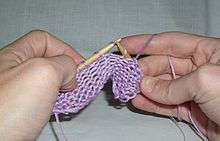knit
English

Knitting
Etymology
From Middle English knitten, from Old English cnyttan (“to fasten, tie, bind, knit; add, append”), from Proto-Germanic *knutjaną, *knuttijaną (“to make knots, knit”). Cognate with Old Norse knýta (Danish knytte), Norwegian Nynorsk knyta) and Northern German knütten. More at knot.
Pronunciation
- IPA(key): /ˈnɪt/
Audio (UK) (file) - Rhymes: -ɪt
- Homophone: nit
Verb
knit (third-person singular simple present knits, present participle knitting, simple past and past participle knit or knitted)
- (transitive, intransitive) To turn thread or yarn into a piece of fabric by forming loops that are pulled through each other. This can be done by hand with needles or by machine.
- to knit a stocking
- The first generation knitted to order; the second still knits for its own use; the next leaves knitting to industrial manufacturers.
- (figuratively, transitive) To join closely and firmly together.
- The fight for survival knitted the men closely together.
- 1609, William Shakespeare, Sonnet 26,
- Lord of my love, to whom in vassalage
- Thy merit hath my duty strongly knit,
- To thee I send this written embassage,
- 1611, King James Version of the Bible, 1 Samuel 18:1,
- And it came to pass, when he had made an end of speaking unto Saul, that the soul of Jonathan was knit with the soul of David, and Jonathan loved him as his own soul.
- 1637, John Milton, A Maske Presented at Ludlow Castle, 1634, London: Humphrey Robinson, p. 6,
- Come, knit hands, and beate the ground
- In a light fantastick round.
- 1672, Richard Wiseman, A Treatise of Wounds, London: Richard Royston,
- Nature cannot knit the bones while the parts are under a discharge.
- 1850, Alfred, Lord Tennyson, In Memoriam, London: Edward Moxon, Canto 39, p. 60,
- Her office there to rear, to teach,
- Becoming as is meet and fit
- A link among the days, to knit
- The generations each with each;
- (intransitive) To become closely and firmly joined; become compacted.
- (intransitive) To grow together.
- All those seedlings knitted into a kaleidoscopic border.
- (transitive) To combine from various elements.
- The witness knitted together his testimony from contradictory pieces of hearsay.
- (intransitive) Of bones: to heal following a fracture.
- I’ll go skiing again after my bones knit.
- (transitive) To form into a knot, or into knots; to tie together, as cord; to fasten by tying.
- c. 1596, William Shakespeare, King John, Act IV, Scene 1,
- When your head did but ache,
- I knit my handkercher about your brows,
- 1611, King James Version of the Bible, Book of Acts 10:11,
- [He] saw heaven opened, and a certain vessel descending upon him, as it had been a great sheet knit at the four corners […]
- c. 1596, William Shakespeare, King John, Act IV, Scene 1,
- (transitive) To draw together; to contract into wrinkles.
- c. 1590, William Shakespeare, Henry VI, Part 2, Act III, Scene 1,
- He knits his brow and shows an angry eye,
- c. 1590, William Shakespeare, Henry VI, Part 2, Act III, Scene 1,
Derived terms
Translations
to make fabric from thread or yarn
|
|
to join closely together
intransitive: to become closely joined
to combine from various elements
|
|
- The translations below need to be checked and inserted above into the appropriate translation tables, removing any numbers. Numbers do not necessarily match those in definitions. See instructions at Wiktionary:Entry layout#Translations.
Translations to be checked
Noun
knit (plural knits)
- A knitted garment.
- 2012, Melanie Calvert, Freycinet (page 105)
- There are grey Grecian tops and a light, sheer, silver cardigan. Stylish dark grey tailored trousers, silver thongs and shiny jet-black stilettos. Black sheer blouses with squared bib fronts, and expensive-looking black and dark grey woollen knits.
- 2012, Melanie Calvert, Freycinet (page 105)
- A session of knitting.
- 2014, Elvira Woodruff, To Knit or Not to Knit
- It's always time for a bit of a knit.
- 2014, Elvira Woodruff, To Knit or Not to Knit
Anagrams
This article is issued from
Wiktionary.
The text is licensed under Creative
Commons - Attribution - Sharealike.
Additional terms may apply for the media files.